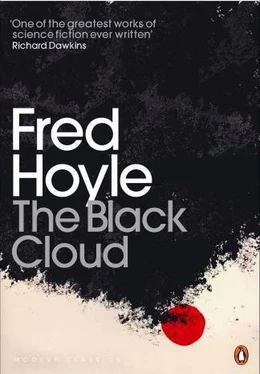Fred Hoyle - The Black Cloud
Здесь есть возможность читать онлайн «Fred Hoyle - The Black Cloud» весь текст электронной книги совершенно бесплатно (целиком полную версию без сокращений). В некоторых случаях можно слушать аудио, скачать через торрент в формате fb2 и присутствует краткое содержание. Жанр: Фантастика и фэнтези, на английском языке. Описание произведения, (предисловие) а так же отзывы посетителей доступны на портале библиотеки ЛибКат.
- Название:The Black Cloud
- Автор:
- Жанр:
- Год:неизвестен
- ISBN:нет данных
- Рейтинг книги:5 / 5. Голосов: 1
-
Избранное:Добавить в избранное
- Отзывы:
-
Ваша оценка:
- 100
- 1
- 2
- 3
- 4
- 5
The Black Cloud: краткое содержание, описание и аннотация
Предлагаем к чтению аннотацию, описание, краткое содержание или предисловие (зависит от того, что написал сам автор книги «The Black Cloud»). Если вы не нашли необходимую информацию о книге — напишите в комментариях, мы постараемся отыскать её.
The Black Cloud — читать онлайн бесплатно полную книгу (весь текст) целиком
Ниже представлен текст книги, разбитый по страницам. Система сохранения места последней прочитанной страницы, позволяет с удобством читать онлайн бесплатно книгу «The Black Cloud», без необходимости каждый раз заново искать на чём Вы остановились. Поставьте закладку, и сможете в любой момент перейти на страницу, на которой закончили чтение.
Интервал:
Закладка:
Those who have experienced the coming of sunrise after a cold night in the desert will have a faint idea of the joy brought by the dawn of 24 October 1965. A word about religion may be in order. During the approach of the Cloud all manner of religious beliefs had flourished mightily. During the spring, the Jehovah’s Witnesses had robbed all other speakers in Hyde Park of their audiences. Incumbents of the Church of England had been astonished to find themselves preaching to overflowing congregations. All this was swept aside on 24 October. Everyone, men and women of all creeds — Christian, Atheist, Mohammedan, Buddhist, Hindu, Jew — all became pervaded to their innermost beings with the emotional complex of the old Sun-worshippers. True, Sun-worship never became an established religion, for it had no central organization, but the undertones of the ancient religion were set vibrating and were never again damped out.
Tropical areas were the first to thaw. Ice disappeared from the rivers. Snow melted with more flooding, but the effects were marginal compared with what had gone before. The thaw in North America and in Europe was only partial, for in the ordinary way of things winter was coming on.
Vast as was the human suffering in the heavily industrialized countries, industrial populations fared far better than the less fortunate peoples, emphasizing the importance of inanimate energy and of the control of machines. It should be added that the situation in this respect might have been very different if the cold had continued to deepen, for relief came at a time when industrialization was on the verge of widespread collapse.
Somewhat paradoxically, among non-industrialized peoples, those of the tropics were hardest hit, while the genuinely nomadic Esquimaux came off best of all. In many parts of the tropics and semi-tropics as many as one person in two lost his life. Among the Esquimaux there was comparatively little loss of life, comparatively little more than in the normal way of things, that is to say. The heat had not been so great in the far north. The Esquimaux had found it highly unpleasant but no worse. Melting ice and snow interfered with their freedom of movement, thereby seriously reducing the area over which they could hunt. But the heat was not so great as to be lethal to them. Nor was the intense cold. They simply dug themselves into the snow and waited, and in this they were better off in many respects than the people of England.
Governments everywhere were in a shaky condition. Now, if ever, was the time for Communism to sweep the world. Now was the time for the United States to stamp out Communism. Now was the time for dissident groups to capture their Governments. But nothing of the sort happened. In the days immediately following 24 October everyone was too overcome with relief and too beaten down to contemplate such seemingly trivial matters. And by the middle of November the opportunity had passed. Humanity had begun to organize itself again into its respective communities.
The Prime Minister returned to London, feeling less unfavourably disposed towards Nortonstowe than might perhaps be expected. For one thing he had passed the time of the crisis far more comfortably than he would have done at Downing Street. For another he had shared the agony of suspense with the scientists at Nortonstowe and there is always a bond between those who have shared a common stress.
Before the Prime Minister left he was warned that there was no reason to suppose that the emergency was at an end. At a discussion, held in one of the laboratories attached to the shelter, it had been generally agreed that Alexandrov’s prognostication was correct. Marlborough said:
“It seems fairly certain that the Cloud is settling into a disk at a pretty high inclination to the ecliptic.”
“Disk stable configuration. Obvious,” grunted Alexandrov.
“It may be obvious to you, Alexis,” broke in Kingsley, “but there’s an awful lot about this business that’s not obvious to me. By the way, what would you put the outer radius of the disk at?”
“About three-quarters of the radius of the Earth’s orbit, about the same as the radius of the orbit of Venus,” answered Marlborough.
“This settling down into a disk must be a relative way of speaking,” Marlowe began. “I suppose you mean that the bulk of the material of the Cloud is settling into a disk. But there must be quite a lot of material spread through the whole of the Earth’s orbit. This is obvious from the stuff that’s hitting our atmosphere all the time.”
“God-awful cold in shadow of disk,” announced Alexandrov.
“Yes, thank goodness we’re clear of the disk, otherwise there’d still be no Sun,” Parkinson said.
“But remember that we shall not stay clear of the disk’ — this from Kingsley.
“What d’you mean by that?’ asked the Prime Minister.
“Simply that the Earth’s motion around the Sun will carry us into the shadow of the disk. Of course we shall come out of the shadow again.”
“Damn cold in shadow,” grunted Alexandrov.
The Prime Minister was worried, and with some justice.
“And how often, may I ask, is this appalling state of affairs likely to arise?”
“Twice a year! According to the present position of the disk, in February and August. The lengths of time for which the Sun will be eclipsed depends on how thin the disk gets. Probably the eclipse will last for somewhere between a fortnight and a month.
“The implications of this are certain to be extremely far-reaching,” sighed the Prime Minister.
“For once we agree,” remarked Kingsley. “Life on the Earth is not going to be impossible but it’ll have to be carried on in far less favourable circumstances. For one thing people will have to get used to living together in quite large numbers. We shall no longer be able to afford to live in individual houses.”
“I don’t follow.”
“Well, heat is lost from a building at its surface. Is that clear?”
“Yes, of course.”
“On the other hand, the number of people that can be housed and sheltered in a building depends essentially on its volume. Since the ratio of surface to volume is much less for a large building than for a small one it follows that large buildings will house people at a far lower fuel consumption per head. If there is to be an endless repetition of periods of intense cold, our fuel resources will admit of no other arrangement.”
“Why do you say “if”, Kingsley?’ asked Parkinson.
“Because so many queer things have happened. I won’t be satisfied with our predictions of what is going to happen next, until I can really understand what has happened already.”
“It might be worth while mentioning the possibility of long-term climatic changes,” remarked Marlowe. “Although this may not be of very great importance in the next year or two, I can’t see how it can fail to be vitally important in the long run — assuming we’re going to have these bi-annual eclipses of the Sun.”
“What have you in mind, Geoff?”
“Well, surely we can’t avoid moving into a new Ice Age. Past Ice Ages show how delicately the Earth’s climate is balanced. Two periods of intense cold, one in winter and the other in summer, must tip the balance on the Ice Age side — the Ice Age plus side, I would say.”
“You mean that ice sheets will sweep down over Europe and North America?”
“I can’t see how it can be otherwise, although it won’t happen in the next year or two. It’ll be a slow cumulative process. As Chris Kingsley says, Man’ll have to come to terms with his environment. And I guess the terms won’t be altogether to his liking.”
“Ocean currents,” said Alexandrov.
“I don’t understand,” said the Prime Minister.
Читать дальшеИнтервал:
Закладка:
Похожие книги на «The Black Cloud»
Представляем Вашему вниманию похожие книги на «The Black Cloud» списком для выбора. Мы отобрали схожую по названию и смыслу литературу в надежде предоставить читателям больше вариантов отыскать новые, интересные, ещё непрочитанные произведения.
Обсуждение, отзывы о книге «The Black Cloud» и просто собственные мнения читателей. Оставьте ваши комментарии, напишите, что Вы думаете о произведении, его смысле или главных героях. Укажите что конкретно понравилось, а что нет, и почему Вы так считаете.












